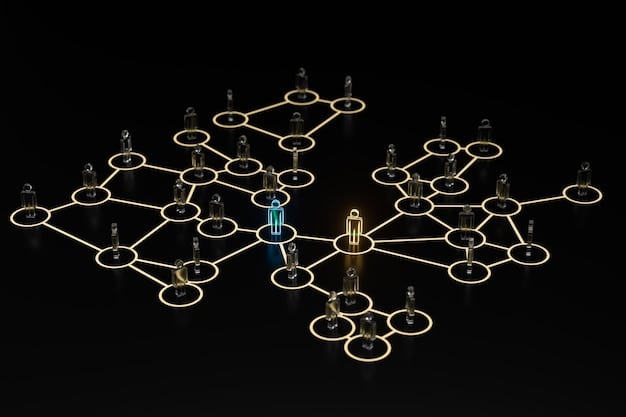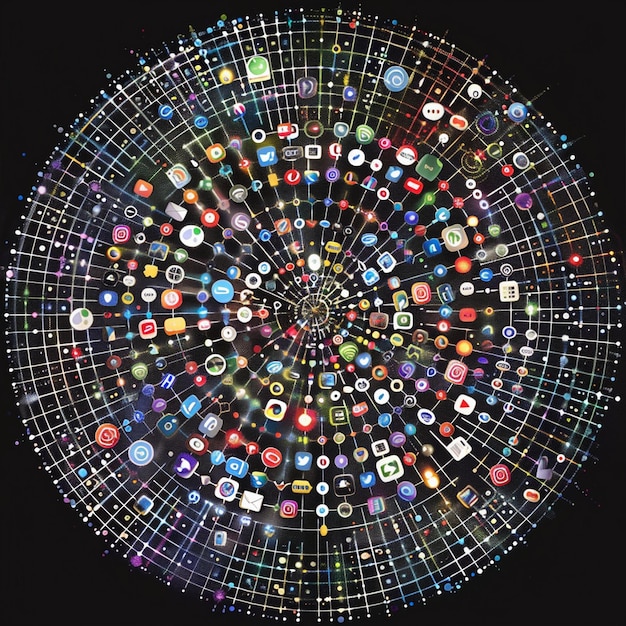Blockchain Social Media: Decentralized Platforms & Data Ownership in the US

Blockchain-based social media platforms offer decentralized alternatives to traditional social networks, giving US users greater control over their data and content, while potentially addressing concerns about privacy and censorship prevalent in centralized platforms.
The rise of centralized social media platforms has led to concerns about data privacy, censorship, and the control these companies wield over user information. Blockchain-based social media: decentralized platforms and user data ownership in the US, offer an alternative paradigm, promising greater user autonomy and control.
Understanding Blockchain-Based Social Media
Blockchain technology’s application extends beyond cryptocurrencies, finding innovative uses in social media. These platforms aim to revolutionize how content is created, shared, and managed online. By leveraging blockchain’s inherent characteristics, they offer solutions to some of the critical issues prevalent in traditional social media.
Key Features of Blockchain Social Media
Blockchain-based social media platforms incorporate several features designed to enhance user experience and address the limitations of centralized networks.
- Decentralization: Data is distributed across a network, reducing reliance on a single point of control.
- Data Ownership: Users have greater control over their data and how it is used.
- Censorship Resistance: Content is more difficult to censor due to the distributed nature of the network.
- Transparency: Transactions and interactions are recorded on a public ledger, enhancing accountability.
These features collectively aim to create a more equitable and user-centric social media environment. Users are empowered to make decisions about their data and participate in a community governance more transparently.

The Appeal of Decentralization for US Users
For users in the US, the appeal of decentralized social media largely stems from growing concerns about the practices of traditional platforms. Issues like data breaches, privacy violations, and algorithmic bias have fueled demand for alternatives that prioritize user rights and data security.
Data Privacy Concerns
The Cambridge Analytica scandal, among other data privacy incidents, has heightened awareness among users about how their personal information is collected and used. Decentralized platforms offer a sense of security by enabling users to control how their data is shared and accessed.
Combating Censorship
Concerns about biased content moderation and arbitrary censorship have also driven interest in blockchain-based alternatives. These platforms often employ decentralized governance models that allow users to have a say in content policies.
The decentralized model provides an attractive proposition for US users seeking greater control over their online presence and data.
Examples of Blockchain Social Media Platforms
Several blockchain-based social media platforms have emerged, each with unique features and approaches to decentralization. These platforms offer diverse functionalities and cater to a variety of users seeking alternatives to mainstream social networks.
Steemit
Steemit rewards users with cryptocurrency for creating and curating content. It utilizes a blockchain-based voting system to determine the popularity and value of posts.
Minds
Minds offers encrypted messaging, decentralized feeds, and token-based rewards for user engagement. It emphasizes privacy and freedom of expression.
Mastodon
Mastodon is a decentralized microblogging platform that allows users to create and join independent communities. It promotes community-based moderation and open-source development.
These platforms represent just a fraction of the emerging blockchain social media landscape, each with its unique approach to decentralization and user empowerment.

User Data Ownership: A Paradigm Shift
User data ownership is one of the most significant advantages of blockchain-based social media. In contrast to traditional platforms where user data is centralized and monetized by the company, blockchain platforms empower users to control their information.
On a blockchain social media platform, user are able to decide for themselves what data they want to share and whom they want to share it with. Blockchain technology ensures transparency about the data and how it is being used.
Empowering Users Through Control
Blockchain-based platforms enable users to retain control over their personal information. They can choose what data to share, who can access it, and how it is used.
Transparency and Accountability
Data transactions are recorded on a public ledger, providing transparency and accountability. This helps users understand how their data is being handled and detect any unauthorized use.
Monetization Opportunities
- Users can earn rewards or payment for creating and curating content.
- Data privacy is enhanced because users control the flow of their information, reducing the risk of data breaches.
- Users have a say in governance decisions, ensuring the platform evolves in a way that benefits the community as a whole.
These benefits make blockchain social media attractive to users seeking greater control and agency in the digital realm.
Challenges and Considerations
Despite their potential, blockchain-based social media platforms face several challenges that could impact their widespread adoption. These challenges include scalability, regulatory uncertainty, and user experience issues.
Scalability Issues
Blockchain networks can struggle to handle a large volume of transactions, leading to slow speeds and high fees. This can be a significant barrier for social media platforms that require real-time interactions.
Regulatory Uncertainty
The regulatory landscape for blockchain technology remains unclear in many jurisdictions, including the US. This uncertainty can hinder the development and adoption of blockchain social media platforms.
Improving User Experience
The user experience on blockchain platforms can be complex, requiring users to manage wallets, keys, and transactions. Simpler user interfaces and onboarding processes are needed to attract mainstream users.
Addressing these challenges is essential for blockchain social media platforms to achieve their full potential.
The Future of Social Media in the US: A Decentralized Vision
The integration of blockchain technology into social media has transformative implications for the future of online interactions in the US. As users demand greater control over their data and seek alternatives to centralized platforms, blockchain-based solutions are poised to play a significant role.
Empowering Users with Blockchain
Blockchain technology can enable greater control over their data and reduce their dependance on centralized platforms that dictate terms and conditions for users’ content creation.
Potential Regulation and Integration
The integration of blockchain social media into the mainstream landscape will require clear regulation and user-friendly tools.
Blockchain-based social media platforms represent a new paradigm in online interactions, with the potential to empower users, preserve privacy, and foster more democratic communities.
| Key Point | Brief Description |
|---|---|
| 🔑 Data Ownership | Users control their data, not centralized platforms. |
| 🛡️ Censorship Resistance | Decentralized networks make censorship more difficult. |
| 💸 Monetization | Users can earn rewards for content creation and curation. |
| 🌐 Decentralization | Data is distributed across the network, avoiding single points of failure. |
Frequently Asked Questions
▼
Blockchain-based social media uses blockchain technology to decentralize content and data ownership, giving users greater control and reducing reliance on traditional platforms.
▼
Decentralization distributes power across a network, enhancing data privacy, reducing censorship, and enabling users to participate in platform governance.
▼
Examples include Steemit, which rewards users for content creation; Minds, offering encrypted messaging; and Mastodon, a decentralized microblogging platform.
▼
Challenges include scalability issues, regulatory uncertainty, and the need for improved user experience to attract mainstream users.
▼
Blockchain platforms give users control over their data, with transparency ensured through public ledgers, reducing the risk of misuse and enhancing privacy.
Conclusion
Blockchain-based social media offers a compelling vision for the future, empowering users with control over their data and fostering more democratic online communities. While challenges remain, the potential benefits of decentralization position it as a transformative force in the social media landscape.





